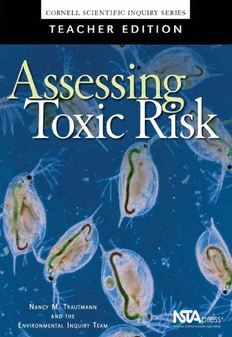
Assessing Toxic Risk, Teacher Edition PDF
59 Pages·2001·0.571 MB·English
Most books are stored in the elastic cloud where traffic is expensive. For this reason, we have a limit on daily download.
Preview Assessing Toxic Risk, Teacher Edition
Description:
How can we decide what concentration of arsenic is acceptable in public drinking water? What does it mean to say that Vitamin D is a highly toxic chemical? How can we balance the risks of spraying pesticides versus the risks of insect-borne diseases such as West Nile Virus, Lyme Disease, or Malaria? Students discover the answers to these intriguing questions and more by delving into the Cornell Scientific Inquiry Series: Assessing Toxic Risk, Student Edition. It includes five chapters of background text on the basic concepts of toxicology. Also included are planning forms, presentation guidelines, and peer review forms that guide students through self-designed research projects that encourage critical thinking. This integrated approach allows students to discover firsthand the natural links between biology, chemistry, environmental science, and human health.
See more
The list of books you might like
Most books are stored in the elastic cloud where traffic is expensive. For this reason, we have a limit on daily download.
